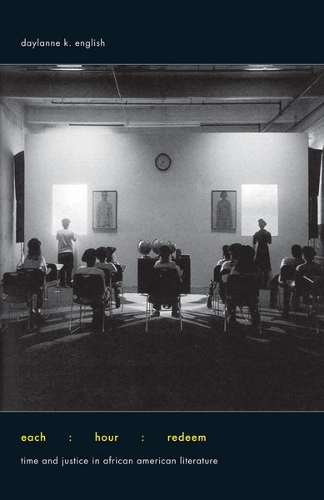
Each Hour Redeem: Time and Justice in African American Literature
(Paperback)
Publishing Details
Each Hour Redeem: Time and Justice in African American Literature
By (Author) Daylanne K. English
University of Minnesota Press
University of Minnesota Press
6th June 2013
United States
Classifications
General
Non Fiction
Social and cultural history
Ethnic studies / Ethnicity
810.9896073
Physical Properties
Paperback
240
Width 140mm, Height 216mm, Spine 25mm
Description
Each Hour Redeem advances a major reinterpretation of African American literature from the late eighteenth century to the present by demonstrating how its authors are centrally concerned with racially different experiences of time. Daylanne K. English argues that, from Phillis Wheatley to Suzan-Lori Parks, African American writers have depicted distinctive forms of temporality to challenge racial injustices supported by dominant ideas of time. The first book to explore the representation of time throughout the African American literary canon, Each Hour Redeem illuminates how the pervasive and potent tropes of timekeeping provide the basis for an overarching new understanding of the tradition.
Combing literary, historical, legal, and philosophical approaches, Each Hour Redeem examines a wide range of genres, including poetry, fiction, drama, slave narratives, and other forms of nonfiction. English shows that much of African American literature is characterized by strategic anachronism, the use of prior literary forms to investigate contemporary political realities, as seen in Walter Mosleys recent turn to hard-boiled detective fiction. By contrast, strategic presentism is exemplified in the Black Arts Movement and the Harlem Renaissance and their investment in contemporary political potentialities, for example, in Langston Hughes and Amiri Barakas adaptation of the jazz of their eras for poetic form and content. Overall, the book effectively demonstrates how African American writers have employed multiple and complex conceptions of time not only to trace racial injustice but also to help construct a powerful literary tradition across the centuries.
Reviews
"Daylanne K. English offers, in exemplary fashion, an analysis both formal and thematic of a small range of texts, fully applicable to the entire range of African American letters. This volume makes a significant contribution to a number of critical conversations in progress that have never so profitably been brought into contact with one another."Aldon Lynn Nielsen, author of Integral Music: Languages of African American Innovation
Author Bio
Daylanne K. English is associate professor of English at Macalester College. She is the author of Unnatural Selections: Eugenics in American Modernism and the Harlem Renaissance.
